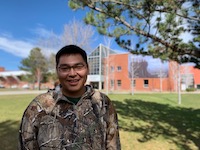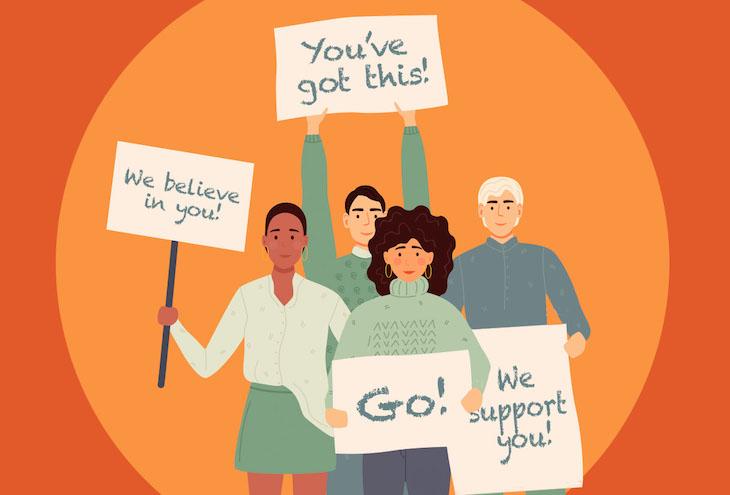If you are a first-generation college student — or will be soon — your world is about to expand in a number of ways. According to the Online Journal for Workforce Education and Development, approximately 50 percent of today’s college students are in proud, but uncharted, territory as the first in their family to attend a four-year college or university. Whether you’re getting ready to attend school on campus or online, it’s a big deal.
So how do you set yourself up for success? While there is no magical answer, there are steps you can take to make the transition more manageable, and to stay on track for graduation. Here are some insider tips.
Begin with Perspective
“If you are a first-generation college student, you’re taking on a mission that will help you learn and understand more about what you’re capable of, from new ways of thinking to your capacity for perseverance,” says Billie Jo Kipp, PhD, a member of the Blackfeet Nation and former president of both Blackfeet Community College and California Tribal College. Kipp suggests going into your college education with an open mind. You’re about to encounter a lot of new people, information, and ideas.
“When I was in high school (many years ago but not so long ago that I don’t remember), I had no idea what college would be like,” notes American Indian College Fund President and CEO Cheryl Crazy Bull, who writes about preparing for college in the Native Pathways Guidebook. “I was in a public school on my home reservation and many of us were expected to go to college, but we didn’t have many opportunities to learn what that meant.” She advises arming yourself with the awareness that you won’t always know what’s going to happen next. And that’s okay. The bottom line: Your college story is just beginning to unfold.
Find Support and Resources
No first-time college student is expected to go it alone. While the demands can easily become overwhelming, there are resources that can help. Even before you make the leap to college, there are programs like the U.S. Department of Education’s Upward Bound initiative that provide counseling and enrichment opportunities. Once you begin taking classes, you’ll find your school has programs for students navigating the college learning curve. From orientation to tutoring and academic advisors, more options are there than you think.
It’s also a good idea to identify networks of support, like AISES and clubs organized around academic subjects or civic activities. Getting involved can be a great way to meet like-minded people, keep your perspective, and even discover new interests. College is about seizing opportunities and finding common ground with the people around you, however different your lives may look to each other. Without overloading your schedule, it’s good to strive for a balance between classes, any work obligations, and school activities, whether virtual or in person.
In addition, there are informal ways to seek guidance from professors and staff who are potential mentors. “It’s important to reach out for help and support when you need it,” says Mandy Smoker Broaddus, an enrolled member of the Assiniboine and Sioux Tribes of the Fort Peck Reservation and a practice expert for Education Northwest. “Even if you don’t have any American Indian professors or advisors, there are still people who understand what it’s like to feel uncomfortable or unsteady in a new environment,” she adds. “It’s incredibly helpful to find people in a position to be your advocate”
Study and Speak Up
Once you get settled into your class schedule, expect a lot of work — and the stress that can come with it. One of the best ways to counteract any pressure is to establish a study routine that works for you, then stick with it. There will always be potential distractions, so self-discipline will be required. Resist any tendency to multitask during class or study time, especially if you’re learning remotely. As you increasingly focus on your classwork, you’ll become aware of things you have questions about. And once you have these questions, ask them! That’s right, speak up.
Experts agree that speaking in class is a vital part of the college experience. Even if it doesn’t come easily, it’s something that can make a lasting difference in your education. “It can be intimidating to speak up, especially when you’re going to college without really knowing what to expect,” observes Kipp. “You may need to learn new ways to dialogue. But allowing people to get to know you, and understand you, will be enriching for them as well as you.”
If you’re not a naturally outgoing person, you might want to start with small steps. For example, talking with a professor during office hours can offer an opportunity to ask a few questions, establish a rapport, and practice being more verbal about an academic subject. As you feel more comfortable discussing a topic, you’ll become more inclined to ask a question in the classroom or participate in a group discussion.
Dig deep
No matter how prepared you are for college or how hard you work, you will encounter unexpected hurdles. What matters the most is how you deal with them. “I remind students that our ancestors embodied resiliency,” says Kipp. “There will be times when your focused patience and resolve will keep you moving forward.”
“Think of your culture as a resource you can go back to, especially if challenges arise,” adds Kipp. “I often tell American Indian students that your decision to go to college is a calling from your ancestors. Don’t be afraid to lean on their strength and wisdom as you stay on your path.”
Smoker Broaddus also emphasizes the value of tribal identity during times of uncertainty. There is no cookie-cutter formula for solving every problem, but you’ll make things more manageable if you consistently put in the effort to stay on track. “If you show up, draw upon your resilience, and stay in contact with people who believe in you, you will find your footing,” she advises. “And remind yourself that, by definition, all transitions are temporary. It’s never easy to be a ‘first,’ but it will always be worthwhile.”
 On Topic
On Topic
Andrew Nicolai, Yup’ik, is from Kwethluk, Alaska, and studies mechanical engineering at the University of Alaska Fairbanks. He learned about AISES during his first year of college from his academic advisor, Olga Skinner. She suggested that he attend the chapter meetings and he’s never looked back. He attended the 2017 AISES Leadership Summit in Chandler, Ariz., the 2017 AISES National Conference in Denver, the 2018 AISES Regional Conference in Portland, Ore., and this year’s virtual AISES National Conference.
Desiree Brazeau, Seneca, is an AISES Sequoyah Fellow. She is currently a graduate student at Loma Linda University, studying occupational therapy.
What does it mean to you to be a first-generation college student?
Andrew: Knowing that I am a first-generation college student, I feel a lot of pressure to finish my degree. However, I am very grateful for the opportunity to go to college.
Desiree: Pursuing my educational goals has been more than pursuing a career, it’s an opportunity my mom and grandmothers didn’t have. It means many things to me, but most important it means I will be better equipped to serve the families I work with. As I learn the ins and outs of our for-profit health care system, I aim to be an advocate for those I serve as a provider.
As a first-generation college student, what obstacles did you face when applying to college and getting settled in?
Andrew: When I was applying to college, I knew there were a couple of obstacles I was going to face, like being far from home and getting used to living in a different environment.
Desiree: Navigating higher education from community college to Loma Linda University had many challenges from financial aid and retaking courses to learning to balance my workload. At community college, the student transfer center was helpful with the application process and touring of different campuses. At Cal Poly Pomona, the Native American Student Center really helped me to plug in and introduced me to AISES.
What resources helped you?
Andrew: Making new friends and joining different clubs helped a lot. I joined the AISES Chapter my first year of college and went to the Leadership Summit in Chandler, Ariz. Joining AISES helped me connect with other people from all over the U.S., and reminded me that I’m not alone. It has helped guide me to where I am now.
Desiree: AISES! At my first Leadership Summit, I had the opportunity to tour the Mayo Clinic. A National Science Foundation scholarship was a helpful faculty and financial resource through my undergrad studies. Volunteering at a hospital and outpatient clinic was a great resource because I was introduced to different professions, professionals, and areas of practice.
What are three tips you can give other first-generation college students?
Andrew:
1. Attend the lectures. You are paying for them so why not make the most of it.
2. Don’t give up. College is a roller-coaster ride, but in the end it’s all worth it.
3. Get involved! It is a great opportunity for you to join different clubs and meet different people.
Desiree:
1. Balance your workload. That was very hard for me to figure out. Consider the classes you’re enrolled in with your own strengths and weaknesses. I had to learn how to study with classes like anatomy and physiology. Try to balance harder classes with easier classes.
2. Plug in on your campus — for academics and for play! With your own balance in mind, get involved with intramural sports or be an active member of other organizations.
3. Attend conferences. It’s great for professional development, networking, and meeting others who share similar passions.














